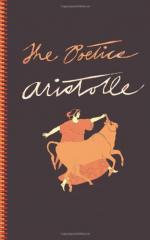|
This section contains 6,429 words (approx. 22 pages at 300 words per page) |

|
SOURCE: "Aristotle on the Purposes of Literature," in Articles on Aristotle: 4. Psychology and Aesthetics, edited by Jonathan Barnes, Malcolm Schofield, and Richard Sorabji, Duckworth, 1979, pp. 166-75.
In the following essay, Gulley studies Aristotle's use of the term "imitation" and the relationship between that which the dramatic or literary artist represents and that which is "true."
In beginning this inaugural lecture I am aware that the notion of inauguration carries the notion of what is propitious. To inaugurate, in its literal Latin sense, is to take omens from the flight of birds. It has a transferred sense of consecrating a place or installing a person in office. In this sense the implication is that the ceremonial omens are favourable. Here are two modern dictionary definitions of it:1 (i) to begin or initiate under favourable circumstances, with a good deed or omen, or with propitious exercises; (ii) to commence or...
|
This section contains 6,429 words (approx. 22 pages at 300 words per page) |

|


